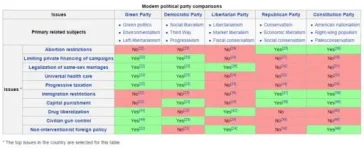blacksmith
Member
- Joined
- Dec 20, 2014
- Messages
- 108
- Reaction score
- 7
- Gender
- Undisclosed
- Political Leaning
- Undisclosed
How can someone call that a democracy?
When I think of democracy, I think of the Canadian political system, where there are many parties and anyone can start his own party given that the person has enough money.
I am surprised that most American politicians seem to ignore this issue.
When I think of democracy, I think of the Canadian political system, where there are many parties and anyone can start his own party given that the person has enough money.
I am surprised that most American politicians seem to ignore this issue.

